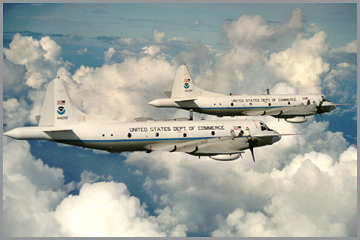A .gov website belongs to an official government organization in the United States.
A lock () or https:// means you've safely connected to the .gov website. Share sensitive information only on official, secure websites.

NOAA's Aircraft Operations Center at MacDill AFB, FL maintains and operates NOAA's aircraft assets. Among them are two Lockheed WP-3D Orion, four engine turbo-prop aircraft, which are mainly used for severe storms and other weather related research. Starting in 1994, these aircraft have been temporarily converted into highly sophisticated airborne air chemistry and aerosol research platforms.
| Parameter | Specification |
|---|---|
| Length | 116' 10" |
| Span | 99' 8" |
| Fuselage Diameter | 11' 3" |
| Ceiling | 25,000 ft |
| Research Speed | 200 knts IAS |
| Range | 1600+ nm |
| Fuel Burn | 4500 - 6000 lbs / hr |
| Fuel Load | 58,000 lbs (48,000 lbs usable; 10,000 lbs reserve) |
| Max Science Payload | ~ 5000 lbs inside fuselage; plus additional instruments in external wing stores |
Operational range is an estimate and actual range is determined by how much fuel can be loaded within the maximum aircraft gross weight limit of 135,000 lbs. We anticipate the aircraft to be 'max zero fuel weight' limited, i.e., with the fuselage loaded to capacity and additional instrumentation operated in external stores (pods) under the wings.
The NOAA WP-3D aircraft are operated by an AOC crew of seven (aircraft commander, pilot, flight engineer, navigator, flight director/meteorologist, and two technicians) and can carry in addition several science personnel. The planned payload relies on the full space and payload weight capacity available.